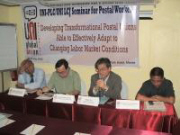Transformational Postal Unions Key to Protecting Postal Workers

|
The government-owned Philippine Postal Corporation (PhilPost) is reeling from declining income and reduced mail volumes as a result of the global crisis and changing market conditions and is under increasing pressure from the government to rationalize and restructure its operations by the end of the year. Realizing the importance of crafting a suitable union response to this situation, the UNI-Philippine Liaison Council (UNI PLC) in cooperation with the Postal Employees Union of the Philippines (PEUP) and the KKKP and the UNI Apro with assistance from the Japan Postal Group Union (JPGU) held a seminar-workshop entitled “Developing Transformational Unions in the Postal Sector Able to Effectively Adapt to the Ever-Changing Labor Market Conditions”. Twenty-one top officials of the Postal Employees Union of the Philippines (PEUP) and the other UNI-affiliated postal union, the KKKP, attended the seminar held last 28-29 May 2009 at the Bayview Park Hotel in Manila. UNI Apro Regional Secretary Christopher Ng, in his keynote address to the seminar, emphasized that the effect of globalization without social and labor dimensions is the deterioration of workers’ working and living conditions and widening inequality that is wiping out the middle class in most countries, even the developed ones. It is for this reason that the UNI Apro is deeply involved in trying to establish control and influence in the regional integration process such as the ASEAN Economic Community as well as in engaging such financial institutions as the Asian Development Bank (ADB). UNI Apro Director for Post and Logistics, Eiichi Ito, lauded the efforts of the postal union affiliates of UNI, particularly the PEUP, in ensuring that employee’s welfare is protected in the restructuring process at the PhilPost. UNI-PLC General Secretary Jose P. Umali, Jr. urged greater unity between the two postal unions. As well, he urged the utilization of social dialogue in order to promote the viability of the public postal service and protect the interest of postal employees. PEUP Chairman, Diosdado de Guzman, updated the participants on the key issues confronting the employees of the PhilPost. The Philippine government is currently implementing the rationalization of government agencies and government-owned corporations. It has given the PhilPost management until the October 2009 to finish its rationalization plan. The PEUP, being the legitimate representative of PhilPost employees and its collective bargaining agent, has demanded participation in the rationalization process and was given a seat in the Change Management Committee that is crafting the rationalization plan for PhilPost. De Guzman reported that, as a result of union representation, the personnel complement within the PhilPost will not be reduced. The union is trying very hard to see to it that no postal employee, not even the 2,000 casual (non-regular) employees, is forcibly retrenched in the rationalization process. The union is also negotiating for suitable separation package for those that opt for voluntary separation. The union is contributing to efforts aimed at improving the market standing of the PhilPost vis-à-vis private courier and mail services—modernization of postal service, ensuring quality and more efficient service to the public, and introduction of new services. Eiichi Ito, Dr. Rene Ofreneo of the University of the Philippines School for Labor and Industrial Relations and Bobbit Librojo of the UNI-PLC briefed the participants on the global economic crisis, its effects on the post and logistics sector at the global, regional and national levels, the Philippine government’s response to the crisis, and the situation of the postal industry. Armed with the above data, the participants discussed and formulated recommendations for the PhilPost and for union transformation and revitalization. Among the recommendations for the PhilPost are: modernization of equipment and facilities, upgrading of the knowledge and skills of employees, reform in the organizational structure and deployment of personnel, introduction of new services (logistics and warehousing, packaging, letter shopping, remittance, payment centers, etc.) and improving quality of services. Among the recommendations for union renewal and transformation are: intensification of social dialogue with the company, greater unity and coordination between the two postal unions, enhanced training for the development of union leaders, intensified coalition with other unions and civil society organizations, and augmented union services for the welfare of postal employees. |




